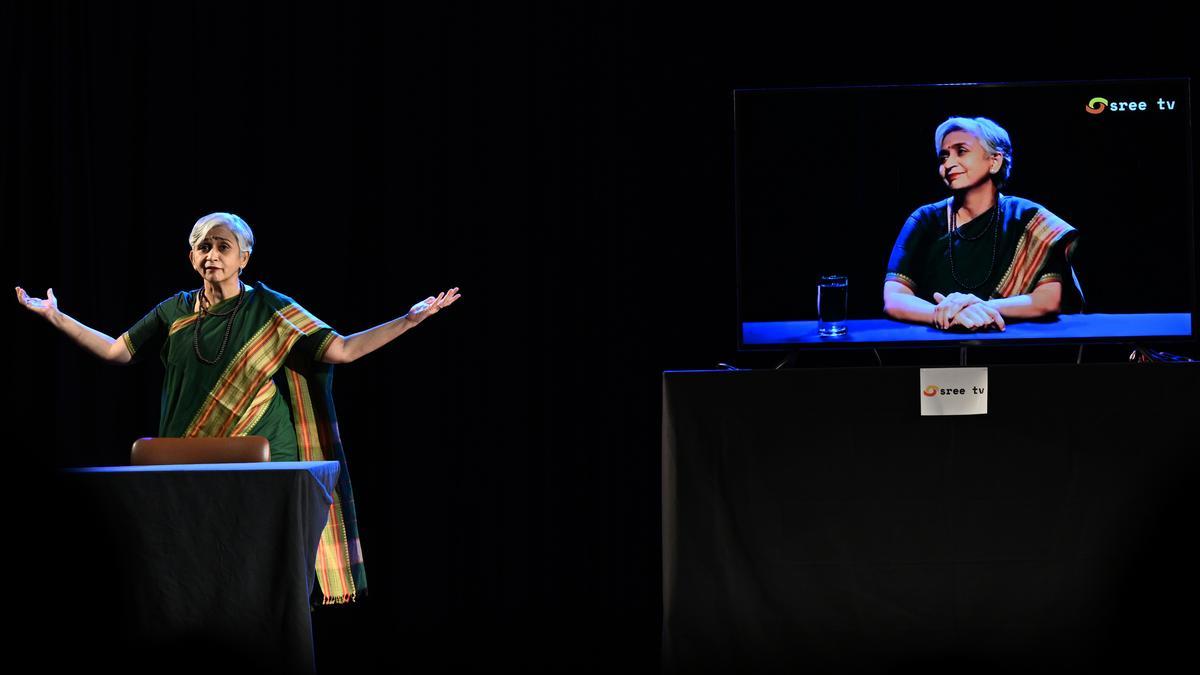
The intimate confines of Bharatiya Vidya Bhavan in Mylapore recently witnessed the debut of “Anniyal,” a Tamil adaptation of Girish Karnad’s seminal play “Odakalu Bimba,” also known as “Broken Images.” Directed by R. Giridharan, “Anniyal” offers a profound examination of the delicate nature of self-perception and the dualities that reside within us. The play unfolds to reveal how meticulously crafted public personas can crumble under the weight of buried truths and suppressed inner voices, much like the experience of Anjali, the play’s central character.
“Anniyal,” with just one performer on stage — Latha Venkat — becomes a tour de force in solo theatrical presentation. Latha captures the essence of Anjali, a celebrated author who navigates the treacherous waters of fame and identity. The play lays bare the pretensions of the intellectual elite, deconstructing the pervasive snobbery that exalts English literature while dismissing vernacular works.
In this engrossing narrative, Anjali’s character embodies the struggle between authenticity and the allure of outward success. Though she has authored a well-received book of Tamil short stories, Anjali laments the meager financial rewards, quipping that the earnings wouldn’t suffice to cook even a simple sambar. In stark contrast, her English novel earns her a significant advance, enabling her to resign from her lecturing job, epitomizing the commercial disparity between regional and English language literature. However, this success is mired in deception — the novel she touts as her own is actually penned by her deceased, invalid sister Aarti, a fact Anjali keeps hidden to bask in the glory of literary acclaim.
The play begins with Anjali radiating confidence as she engages with her readers on a television program. She deftly manipulates her audience, feigning sorrow over her sister Aarti’s fate and showcasing her linguistic prowess. The façade shatters after the broadcast when Anjali is confronted by a spectral image of Aarti on the television screen. This haunting apparition serves as the catalyst for Anjali’s psychological unravelling. Each lie and excuse Anjali employs to justify her actions is systematically dismantled by Aarti’s relentless presence, casting a dark shadow over her accomplishments.
As the drama intensifies, Anjali’s veneer of assuredness erodes, leaving her exposed to her inner demons.
. The sight of Aarti’s image, an enduring reminder of her betrayal, begins to haunt Anjali relentlessly. It symbolizes the inescapable guilt that now mars her every achievement, from the pages of her celebrated book to the financial rewards it brings. This internal conflict is further exacerbated by her strained relationship with her husband and the incessant pangs of her conscience.
Latha Venkat’s portrayal of Anjali’s descent from a confident author to a guilt-ridden and tormented figure is nothing short of masterful. Her ability to convey subtle shifts in emotion, coupled with the intensity of her performance, ensures that the audience is wholly immersed in Anjali’s turmoil. The script, co-created by G.P.R. Prasanna and R. Giridharan, is meticulously crafted, seamlessly blending dialogue and monologues to elevate the play’s emotional and thematic resonance.
“Anniyal” not only underscores the fragility of the self-images we curate but also illuminates the destructive power of suppressed truths. It’s a poignant reminder that the personas we present to the world are often fragile constructs, susceptible to collapse when confronted by the unresolved parts of our psyche.
With its powerful script and an outstanding solo performance, “Anniyal” succeeds in engaging its audience on multiple levels. The production challenges viewers to reflect on their own lives, questioning the authenticity of the images they project and the hidden truths they might be concealing. It’s a testament to the enduring relevance of Karnad’s original work and its potential to inspire profound introspection through its adaptation into different cultural contexts.
In an era where public perception often defines success, “Anniyal” serves as a vital narrative, compelling audiences to ponder the cost of maintaining facades and the inevitable reckoning with one’s true self. Through Anjali’s journey, the play vividly illustrates that self-assurance built on falsehoods is ultimately unsustainable, and the relentless voice of conscience cannot be easily silenced.












